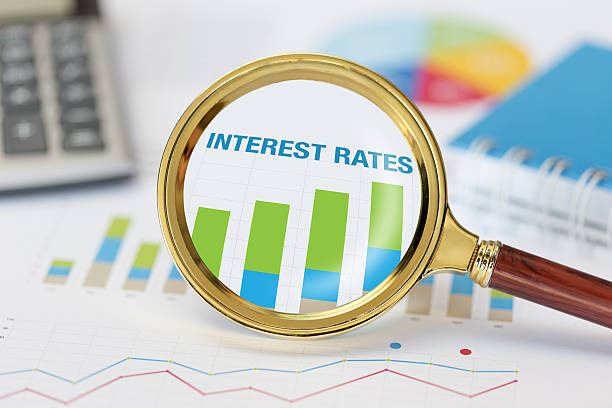The impact of the interest rate is unavoidable.
It’s taken dramatic turns in the past few years.
So, at some point, it stops being a little discomfort or a little problem that will go away if you ignore it.
The rise and fall of the interest rate have impacted and will continue to impact personal finance and investing.
It will be necessary to know how to identify these impacts and address them if needed.
This article should give an insight into all of them.
What is an Interest Rate?
An interest rate is the percentage at which interest is charged on a loan.
It is typically expressed as an annual percentage of the principal.
It is the cost of borrowing money, and the lender typically determines the rate.
The interest rate can be fixed or variable, and it is often used as an indicator of the overall cost of credit.
When you borrow money, whether it’s a loan, a credit card, or a mortgage, the lender will charge you interest on the amount.
The interest rate represents the percentage of the loan amount you will have to pay back in addition to the principal.
For example, if you borrow $100 at a 5% interest rate, you will have to pay back $105 over the life of the loan.
The $5 difference is the interest.
Interest rates play a critical role in the economy.
Innovative Tech Solutions, Tailored for You
Our leading tech firm crafts custom software, web & mobile apps, designed with your unique needs in mind. Elevate your business with cutting-edge solutions no one else can offer.
Start NowThey help manage inflation and control the overall level of economic activity.
Central banks, such as the Federal Reserve in the United States, use interest rates to influence the economy.
They do this by raising or lowering the cost of borrowing money.
When interest rates are high, borrowing money becomes more expensive.
Interest rates can also affect the value of investments since the rate of return on investment is often tied to the interest rate.
When interest rates rise, the rate of return on investments such as bonds may decline.
This makes them less attractive to investors.
In contrast, when interest rates fall, the rate of return on investments such as bonds may increase.
This makes them more attractive to investors.
Overall, interest rates are very important concepts for investors, businesses, and consumers.
They impact the cost of borrowing, the returns on investments, and the overall state of the economy.
Read: Understanding the Impact of Interest Rates on Bonds

Impact of Interest Rate on Personal Finance
Interest rates play a significant role in personal finance as they affect various financial decisions and activities.
When interest rates are low, borrowing money becomes less expensive.
This makes it easier for individuals to purchase homes, cars, and other large items on credit.
Additionally, low interest rates can make it more affordable for individuals to carry credit card balances, student loans, and other forms of debt.
Conversely, when interest rates are high, borrowing money becomes more expensive.
This can make it more difficult for individuals to purchase homes, cars, and other large items on credit.
High interest rates can also make it less affordable for individuals to carry credit card balances, student loans, and other forms of debt.
Interest rates also influence investment decisions.
When interest rates are low, the returns on savings accounts and other fixed-income investments may be lower, making them less attractive to investors.
Conversely, when interest rates are high, the returns on savings accounts and other fixed-income investments may be higher, making them more attractive to investors.
In summary, interest rates majorly impact personal finance and financial decisions, particularly regarding borrowing, saving, and investing.
Read: The Wonders of Compound Interest
Seamless API Connectivity for Next-Level Integration
Unlock limitless possibilities by connecting your systems with a custom API built to perform flawlessly. Stand apart with our solutions that others simply can’t offer.
Get StartedImpact of Interest Rates on Investing
Interest rates significantly impact investment decisions and returns on various types of investments.
When interest rates are low, the returns on fixed-income investments such as bonds may be lower, making them less attractive to investors.
Low interest rates can also make other investments, such as savings accounts and certificates of deposit, less attractive as they offer low returns.
However, low interest rates can also make other investments, such as stocks, more attractive.
They make borrowing money cheaper, which can lead to increased business activity and economic growth.
This can boost corporate profits and make stocks more valuable.
Additionally, the low interest rate may lead investors to look for alternatives with higher returns, such as stocks and mutual funds, as compared to bonds.
When interest rates are high, the returns on fixed-income investments such as bonds may be higher, making them more attractive to investors.
High interest rates also decrease the value of bonds issued with lower interest rates.
This may lead investors to shift from bonds to cash and cash equivalents that offer relative stability and safety.
In summary, interest rates play a critical role in investment decisions, as they affect the returns on various types of investments and can lead to changes in the overall investment climate.
When interest rates are low, it can make stocks more attractive but decrease the appeal of bonds, savings accounts, and other fixed-income investments.
On the other hand, when interest rates are high, it can make bonds and other fixed-income investments more attractive but may decrease the appeal of stocks and other riskier investments.
Investors need to be aware of the current interest rate environment and understand how it might affect their investment portfolio.
Read: Investing in Gold: A Safe Haven or a Risky Bet?
How Interest Rates Affect the Overall Economy and Job Market
The Federal Reserve, the United States’s central bank, uses interest rates to influence the economy by raising or lowering the cost of borrowing money.
When interest rates are low, borrowing money becomes less expensive.
This can spur economic growth by making it easier for businesses to access credit, invest in new projects, expand their operations, and hire more employees.
This can lead to increased business activity, job creation, and higher wages.
Low-interest rates also make it more affordable for consumers to purchase homes, cars, and other big-ticket items.
This can boost consumer spending and further stimulate economic growth.
On the other hand, when interest rates are high, borrowing money becomes more expensive, which can slow down economic growth by making it harder for businesses to access credit, invest in new projects, expand their operations, and hire more employees.
This can lead to decreased business activity and job losses, as well as lower wages.
High interest rates also make it less affordable for consumers to purchase homes, cars, and other big-ticket items, slowing down consumer spending and further dampening economic growth.
Transform Business with Custom CRM & ERP Solutions
Elevate your operations with a CRM or ERP tailored for you. Let’s build the perfect solution that others can't replicate—crafted to match your business's needs like no other.
Get StartedInterest rates also play a role in inflation.
High interest rates can decrease spending, which in turn can decrease inflation.
On the other hand, low interest rates can increase spending, which can increase inflation.
Central banks use interest rates to try to control inflation and keep it at a stable level.
In summary, interest rates play a vital role in the economy by affecting borrowing, spending, business and job growth, and inflation.
The interest rate set by the central bank can be used to regulate the economy and job market, influencing the level of economic activity, inflation, and unemployment.
Read: What Makes A Country Wealthy?

How To Manage the Impact of interest rates on Personal Finance and Investing
There are several ways of managing the impact of the interest rate and even how to benefit from it:
Tips for managing debt in a rising interest rate environment
Managing debt in an environment of rising interest rates can be challenging.
Still, there are several steps that individuals can take to minimize the impact of rising interest rates on their finances:
- Prioritize paying off high-interest debt, such as credit card debt, as soon as possible.
- Consider consolidating debt into a single, low-interest loan, such as a personal loan or a home equity loan.
- Refinance existing loans, such as mortgages or car loans, to take advantage of lower interest rates.
- Keep an eye on adjustable-rate loans and consider refinancing them into fixed-rate loans.
- Be proactive about reviewing and potentially renegotiating the terms of your loans with your lender.
- Avoid taking on new debt unless it is necessary and can be easily managed with a plan to pay it off promptly.
- Create and stick to a budget to ensure that you are living within your means and not adding more debt to your existing portfolio.
By taking these steps, people can help minimize the impact of rising interest rates on their debt and maintain control of their finances in a rising interest rate environment.
Investment strategies for a rising interest rate environment
In a rising interest rate environment, investment strategies may include focusing on short-term bonds and cash alternatives, as they are less sensitive to interest rate changes than longer-term bonds.
Also, investing in dividend stocks can provide a buffer against rising rates.
Real estate investment trusts (REITs) and utilities, which tend to have steady cash flows, can also be good options.
One may also consider investing in Treasury Inflation-Protected Securities (TIPS), which are linked to inflation.
It is also important to review and potentially adjust the bond portion of a portfolio.
This helps to reduce interest rate risk and look for opportunities in undervalued sectors that may benefit from higher rates, such as the financial, industrial, and material sectors.
Ways to potentially benefit from changes in interest rates
Individuals and investors may potentially benefit from changes in interest rates in several ways.
When interest rates are low, it may be a good time to borrow money, as the cost of borrowing will be less.
Additionally, low interest rates may lead to an increase in the prices of assets such as stocks and real estate as investors seek higher returns in a low-yield environment.
As interest rates rise, the value of existing bonds may decrease, but the yields on new bonds will be higher, providing an opportunity for bond investors to potentially earn higher returns.
Savers may also benefit from rising interest rates, as they will earn more on their savings deposits and money market accounts.
Finally, businesses with variable-rate debt may benefit from rising interest rates, as the rate increase may decrease their borrowing costs.
Conclusion
In conclusion, interest rates are a powerful force influencing personal finance and investing.
Tailored Tech Solutions to Drive Your Business Forward
Maximize your business potential with custom tech strategies. We deliver bespoke solutions that others can’t match, designed to solve your specific challenges with precision and impact.
Contact UsWhether rising or falling rates affect borrowing costs, savings returns, and investment opportunities.
By understanding these dynamics and implementing strategies to manage debt and investments, you can navigate the shifting interest rate environment with confidence.
Stay informed, adapt your financial plans as needed, and take proactive steps to protect and grow your wealth.
With the right approach, you can turn interest rate changes into opportunities rather than challenges.
Before you go…
Hey, thank you for reading this blog to the end. I hope it was helpful. Let me tell you a little bit about Nicholas Idoko Technologies.
We help businesses and companies build an online presence by developing web, mobile, desktop, and blockchain applications.
We also help aspiring software developers and programmers learn the skills they need to have a successful career.
Take your first step to becoming a programming boss by joining our Learn To Code academy today!
Be sure to contact us if you need more information or have any questions! We are readily available.











